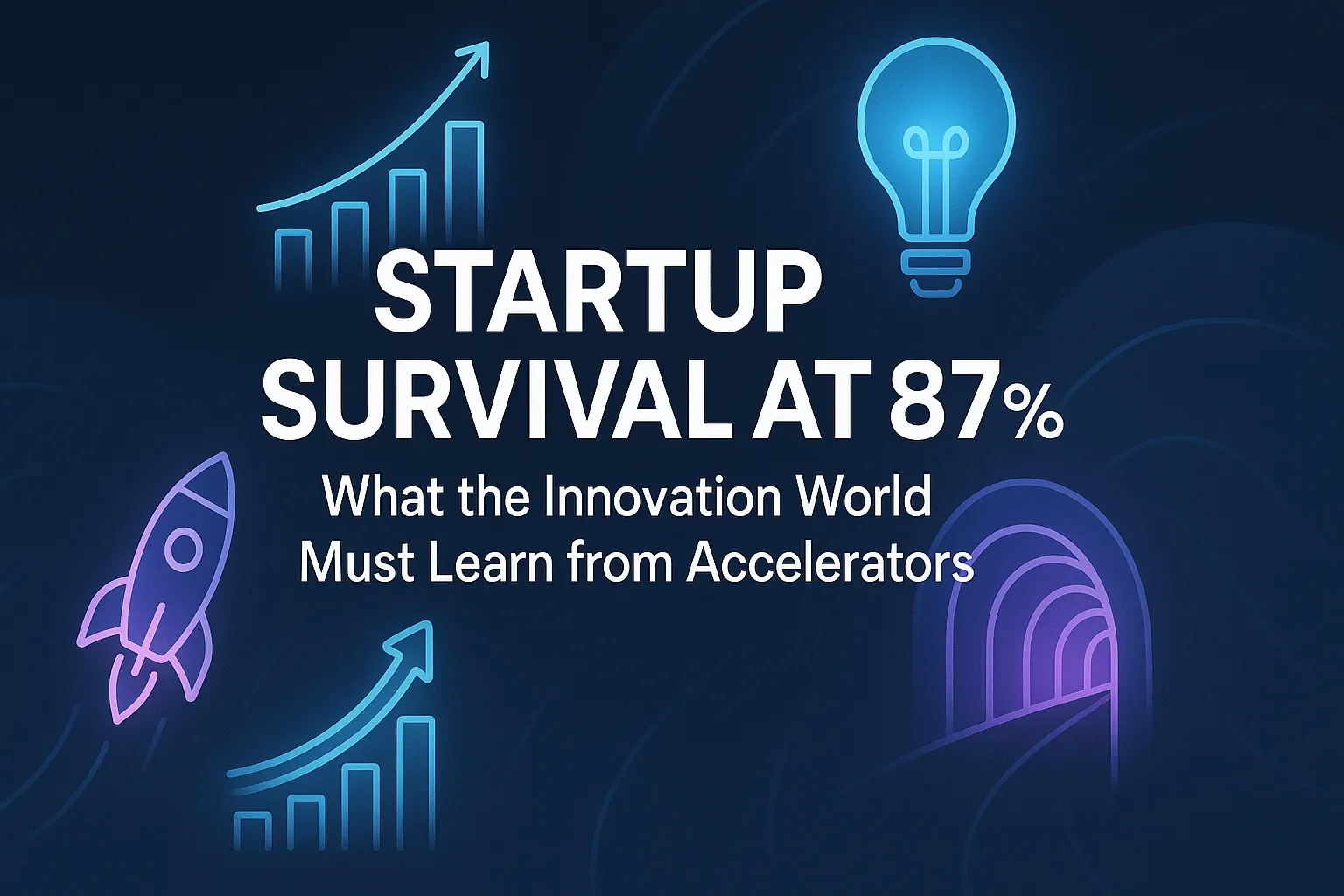Startup Survival at 87%: What the Innovation World Must Learn from Accelerators

Startups today face intense pressure to survive in highly competitive markets. Surprisingly, 87% of those that go through accelerator programs survive and thrive. This data point offers a critical insight into the role structured support plays. Now, it’s time other sectors, especially creators, take notes.
From Seeding to Scaling: A Tale of Two Journeys
Startups begin their journey in either the seeding or scaling phase. Seeding startups struggle to secure funding, mentorship, and visibility. Scaling startups, having validated their idea, find it easier to attract money and support. The gap between the two often determines long-term success.
Accelerators vs. Incubators: What’s the Difference?
Accelerators like Y Combinator and MassChallenge offer structured programs. These include mentorship, funding, deadlines, and investor demos. Incubators, by contrast, offer less structure and fewer resources. The 87% survival rate shows how powerful accelerator frameworks are.
Why Accelerators Work So Well
The key to accelerator success lies in five main factors. These are structured timelines, investor access, capital injection, expert mentorship, and peer feedback. Together, these create a fertile ground for startups to grow. It’s a system that works—and not just for tech companies.
What Incubators Need to Learn
Incubators must evolve if they want to support early-stage ideas effectively. Simply offering office space and Wi-Fi is not enough today. Startups need strategic guidance, measurable milestones, and funding paths. These are all areas where accelerators excel.
Bridging the Gap for Creators and Innovators
This structured model isn’t just for businesses—it applies to creators, too. Writers, designers, researchers, and artists face similar struggles as early startups. Their success also hinges on validation, funding, and recognition. That’s where new tools must come in.
The Creator Economy Is Like a Startup Market
Digital creators now build businesses around their ideas and content. Just like startups, they face issues of discovery, competition, and sustainability. However, most lack the infrastructure that tech startups enjoy. That’s a major reason many creative efforts go unnoticed.
Global Authorship Validation: What It Means
Global Authorship Validation is the process of officially confirming who created a piece of work. It acts like a birth certificate for content, proving its origin and ownership. For digital creators, this is absolutely crucial in protecting intellectual efforts. Without it, recognition becomes a constant struggle.
How Validation Mirrors Startup Due Diligence
Startups go through due diligence to prove ownership and viability. Similarly, Global Authorship Validation helps prove the source of creative works. This reduces plagiarism and ensures rightful credit is given. It creates trust between creators, platforms, and audiences.
Secure Authorship Archive: A Digital Vault
A secure authorship archive is a protected repository for intellectual content. It functions like a digital safe for creators’ ideas, articles, and media. With encryption and timestamping, it ensures data cannot be tampered with. This preserves originality in a permanent way.
The Power of a Protected Creative Legacy
When stored in a secure authorship archive, your work becomes traceable. Any future disputes over ownership can be quickly resolved with proof. It’s like having receipts for every piece of content you create. This adds immense value to your intellectual portfolio.
A Missing Link in the Creator Ecosystem
Many creators rely on publishing platforms for visibility and monetization. Yet, these platforms rarely offer authorship protection or validation. The result is that content can be stolen, copied, or rebranded. Systems like Global Authorship Validation can prevent this.
How Startups Validate, Scale, and Protect
Startup founders protect their business ideas with IP filings, investor contracts, and legal frameworks. Creators must start using similar tools for their content. Whether it’s a poem or a podcast, ownership must be verified and secured. This mindset change is essential.
Creators Deserve the Same Tools as Startups
There’s no reason digital creators should be at a disadvantage. The technology to validate authorship globally and secure archives already exists. What’s missing is mass adoption and integration into creative workflows. Education and accessibility are key to fixing this.
From Innovation to Integrity: Protecting the Source
Integrity starts with knowing where something came from and who made it. In tech, this is standard practice; in content, it is not. But it should be. Global Authorship Validation ensures the creator’s voice remains intact across platforms and time.
Creating a System of Trust and Recognition
Trust is currency in both the startup and creator worlds. Accelerators build trust through validation and investor endorsement. Creators can build similar trust through verifiable authorship and secure archives. This trust enables fair collaboration and recognition.
Building a Content Economy That Scales
The content economy must evolve to treat ideas as assets. Just as startups raise capital on intellectual property, creators can monetize validated work. But without a secure authorship archive, it’s hard to assign real value. Protection enables growth.
Next-Gen Tools for Next-Gen Creators
The next step in the evolution of the creative economy is infrastructure. We need platforms that offer Global Authorship Validation as a core feature. These platforms must also maintain secure authorship archives to safeguard ideas. This will democratize creative success.
What the Data Tells Us About Structure
87% survival is no coincidence; it reflects the value of structure. Creators and incubators must stop relying on ad hoc strategies. Success is engineered through systems, not chance. Validation and protection are foundational elements of that system.
Final Thoughts: Applying Accelerator Lessons Beyond Startups
Accelerators have perfected a model of success built on support and structure. Incubators, creators, and innovators must adapt those same strategies. This includes leveraging tools like Global Authorship Validation and secure authorship archives. In doing so, we can protect creativity and help it flourish.




